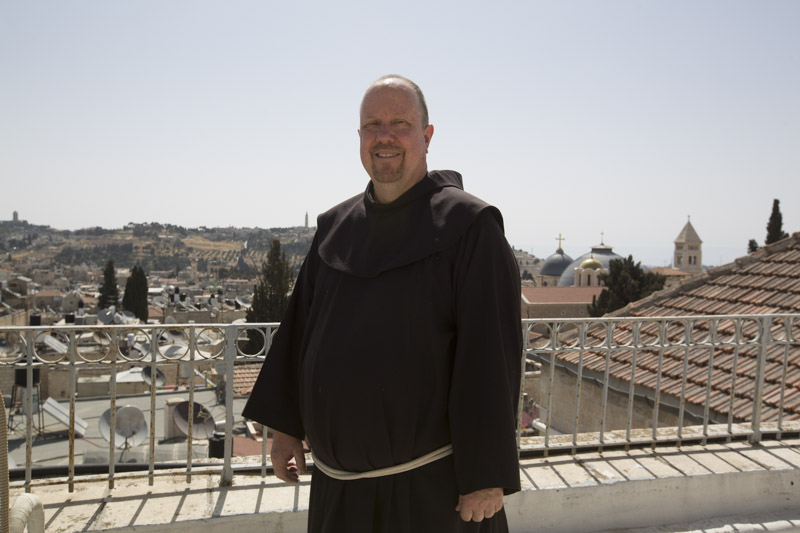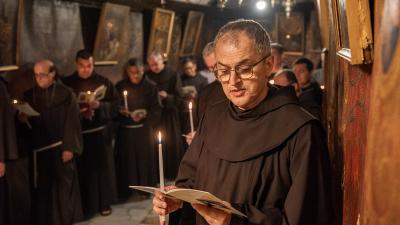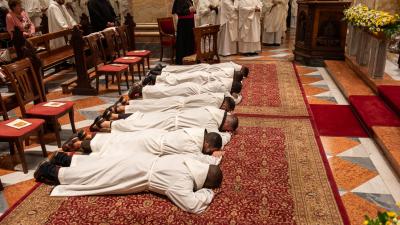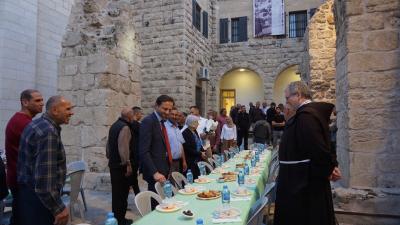
800 years have passed since the friars arrived in the Middle East, and many things have changed since the beginning of this adventure. However, the commitment and dedication with which, for 800 years, the friars have guarded the holy places and have worked to serve the local people have not changed. For this reason, in order to understand what the Custody of the Holy Land is today, we must begin with them and their stories: they come from all over the world and from different countries and each of them has a specific mission.
Fr. Garret Edmunds was born in California and has been a friar for 40 years. In 1998, he arrived in the Holy Land for the first time and was working with pilgrims. Today, he teaches English to the seminarians at St. Savior’s; he also helps with communication and guides the tour groups.
Let's start from the beginning of your story: why did you choose to become a friar?
At first, I was struck by the example of Junipero Serra, who was a Spanish missionary first in Mexico and then California. Every young man in California studies his story and he is a great example as a Franciscan. The figure of St. Francis also attracted me. I was looking for a kind of religious life that could bring together the active and contemplative life.
What was your journey like as a seminarian and a friar?
I first went to secondary school, then to college and I graduated with a degree in political science (my father was a judge). I also worked for a politician in California, but after five years I decided to change my life. I did not know if I would become a friar or a priest, but I wanted to give this path a try. Then, I said “I better go to the Franciscans’ now.” So, I started studying theology at the seminary to become a Franciscan.
Why did you choose the Custody?
Because the Holy Land is the place where Jesus lived. It has a place in our history, but it is also a [rich] geographical area. It is not a coincidence that in school my favorite subject was geography.
The mission of the Custody in the Holy Land is something that all the friars should share. I am part of the province of California, but the Custody is important to me. It is part of our formation as friars minor. The idea of being part of the mission of the Holy Land Province interested me since the time I was a seminarian. For so many years, I accompanied several groups in the Holy Land, becoming a pilgrim myself. Then I was touched by the example of missionary Junipero Serra, one of the first European Franciscans to be on mission in California, and so I thought that I would like to be involved in the mission of the Custody of the Holy Land.
So, I came here and talked to the Custos at the time, who encouraged me to continue working with English-speaking pilgrims. I noticed then that working with the groups was like being on retreat: we were on a bus and would go around. I liked this job and did it for a few years until the second intifada began and pilgrims stopped coming. I went back to the US at that time. I then returned to the Holy Land again in the Holy Land just a few months ago.
What is your mission for the Custody?
My mission is to collaborate with pilgrims, but part of my mission is also to help them directly from Washington, from the Convent of the Custody there.
They asked me to return to the Holy Land to work in English communications and to teach English to some students.
What is behind your mission and spiritual life?
One of the things that most attracted to being a friar was the Franciscan way of living the Gospel. It is important to have an active ministry that brings the Word to people wherever they are.
Another aspect is that of community. Often we are so busy with our work that we do not have time to come together to pray. But the community dimension is the one that gives [the friars] energy: we are a fraternity on a mission.
How do you relate your being a Franciscan and your life here?
There is no other place in the world where the reality of the incarnation is more alive than here. Taking pilgrims from one place to another or working on the Custody’s communication helps to make Jesus’ presence visible. Working in the Custody is very important to show that Jesus is present in the world. This is an aspect of my Franciscan life that I can live out better here. When we are in a sanctuary, Br. Stéphane says during prayers, “Father, we pray HERE where Jesus was…”. I try to do the same thing with the pilgrims, and this way we can truly feel the presence of the incarnate Jesus. This is an important dimension of Franciscan life.
Has living here changed your relationship with religion?
Yes, undoubtedly so. Often the Gospel stories take place where we go, where we celebrate, where we sleep, etc. They take place in at particular times and in particular places, but everyone experiences Jesus’ incarnation through their own culture and in the place where they live. And yet we have the opportunity to go where it all took place.
One of the things I really like about the Holy Land is that this place is a mix of cultures.
What are the obstacles that you are facing today in your mission as a friar in Jerusalem?
I struggle a bit with the language. There are so many different languages here and in order to be understood, we speak Italian, but it is difficult for me to learn this language. Outside of the Custody, English is very important but Italian is the working language inside the Custody. One of my goals is thus to improve [my knowledge of] this language, so as to better participate in the life of the Custody.
In any case, being surrounded by all of these cultures, in this environment, is also a beautiful thing. It’s a challenge, but challenges help people grow. My ministry here, however, is with English speakers.
Would you have a message for a young man who is in a time of discernment [trying] to understand if he has a vocation?
My message is to be open to the way in which God speaks to our hearts, to be open to what God does, to listen to and look to God and other people. God has a plan for each one of us and wants to make us happy.
N.S. - B.G.




